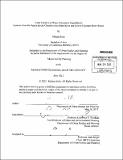| dc.contributor.advisor | Lawrence E. Susskind. | en_US |
| dc.contributor.author | Solis, Miriam | en_US |
| dc.contributor.other | Massachusetts Institute of Technology. Dept. of Urban Studies and Planning. | en_US |
| dc.coverage.spatial | n-us-ga n-us-co | en_US |
| dc.date.accessioned | 2012-10-10T15:49:06Z | |
| dc.date.available | 2012-10-10T15:49:06Z | |
| dc.date.copyright | 2012 | en_US |
| dc.date.issued | 2012 | en_US |
| dc.identifier.uri | http://hdl.handle.net/1721.1/73826 | |
| dc.description | Thesis (M.C.P.)--Massachusetts Institute of Technology, Dept. of Urban Studies and Planning, 2012. | en_US |
| dc.description | Cataloged from PDF version of thesis. | en_US |
| dc.description | Includes bibliographical references (p. 62-72). | en_US |
| dc.description.abstract | Intense water disputes in the United States are being caused by new and conflicting demands from many quarters and changes in water availability that appear to be caused by climate change. Projections of heightened water conflict signify the need to understand the best methods of resolving these disputes. The published literature on negotiation suggests that parties are more likely to develop sustainable agreements and cooperative relationships through an integrative approach to negotiation. In these instances, negotiators work to understand each other's interests to jointly create and distribute value. This thesis examines the role of value creation in water allocation negotiations to determine if and how it enables agreement. Water allocation negotiations in the Lower Colorado River and Apalachicola-Flint- River Basins are compared; an agreement was reached in the first case but not the second. My findings support the hypothesis that value creation enables agreement; they also suggest that even when value is created, its allocation may prevent agreement among parties. Findings are used to deduce a broader set of lessons associated with value creation and the benefits of an integrative approach to negotiating water allocations. | en_US |
| dc.description.statementofresponsibility | by Miriam Solis. | en_US |
| dc.format.extent | 72 p. | en_US |
| dc.language.iso | eng | en_US |
| dc.publisher | Massachusetts Institute of Technology | en_US |
| dc.rights | M.I.T. theses are protected by
copyright. They may be viewed from this source for any purpose, but
reproduction or distribution in any format is prohibited without written
permission. See provided URL for inquiries about permission. | en_US |
| dc.rights.uri | http://dspace.mit.edu/handle/1721.1/7582 | en_US |
| dc.subject | Urban Studies and Planning. | en_US |
| dc.title | Value creation in water allocation negotiations : lessons from the Apalachicola-Chattahoochee-Flint River and Lower Colorado River Basins | en_US |
| dc.type | Thesis | en_US |
| dc.description.degree | M.C.P. | en_US |
| dc.contributor.department | Massachusetts Institute of Technology. Department of Urban Studies and Planning | |
| dc.identifier.oclc | 811404555 | en_US |
